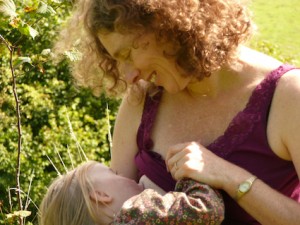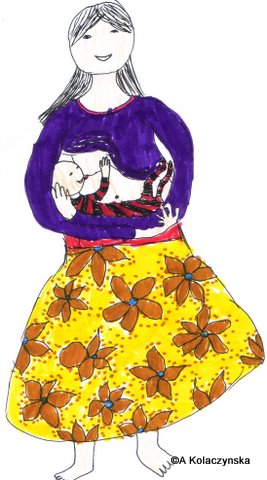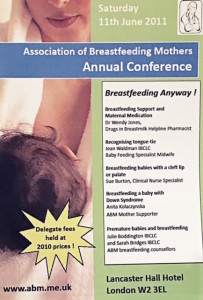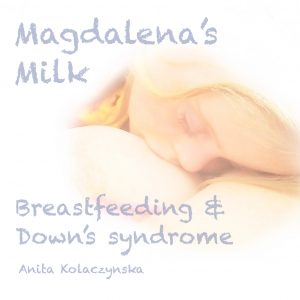There are links at the bottom of this page to leaflets with useful information, growth charts for babies with D.S. and to telephone numbers where you can talk for free to a trained breastfeeding counsellor.
If you are visiting this page because you have just had a baby or if you are about to, then from one mother to another, my warmest Congratulations to you!
 If you want to breastfeed, then there is every likelihood that you can and will. When experiencing difficulties, accessing the right support is the key to having the breastfeeding relationship that you want.
If you want to breastfeed, then there is every likelihood that you can and will. When experiencing difficulties, accessing the right support is the key to having the breastfeeding relationship that you want.
My Story I nurtured my first two children through breastfeeding with ease. When Magdalena was born in 2006, at full term, a home waterbirth weighing 9lb we were ecstatic to meet her beautiful soul and I expected breastfeeding her to be as easy as her birth had been. It turned out that my previous experience of breastfeeding was useless for Magdalena’s needs. She never cried, and was sleepy with hypotonia and a heart condition. I found myself in unknown territory and scared as to how I would get breastfeeding established so that she would thrive. I was waking her up to feed every few hours rather than feeding on demand, and she didn’t want to wake up and would fall asleep at my breast after a few sucks. I began an intense time of surrender and dedication to the present moment, watching, listening, discovering ways to work with Magdalena’s vulnerabilities, until we knew each other deeply. As Magdalena grew stronger in every way through our breastfeeding relationship, breastfeeding became as easy as it had been with my other two children and even more beneficial. For babies with Down’s syndrome are more susceptible to digestive problems, constipation, respiratory infections and lowered immunity and all of these are managed well through breastmilk. My daughter self-weaned aged 5 and besides the infinite blessings of the breastfeeding relationship that we enjoyed, I was so grateful for the immune support it gave her and the strengthening of her oral muscles as a pre-cursor to speech.
I could have saved myself a lot of anxiety and heartache though if I had known where and how to access the right support during this journey.
Getting the right support before and after the birth of your baby
 All babies are different, and there is no way of knowing whether you will face challenges feeding your baby. If you do however, a trained breastfeeding counsellor can support you in getting breastfeeding established. When we want to breastfeed but it’s not happening as we expected and people around us are offering conflicting advice, we can feel desperate, anxious, and overwhelmed. This is when reaching out for support from trained breastfeeding counsellors will help. She will listen to you, observe you feeding your baby, help you identify issues and offer suggestions to remedy these from her wealth of experience. This is an empowering journey, being cheered on in your breastfeeding choices. She can also advocate on your behalf with other health professionals.
All babies are different, and there is no way of knowing whether you will face challenges feeding your baby. If you do however, a trained breastfeeding counsellor can support you in getting breastfeeding established. When we want to breastfeed but it’s not happening as we expected and people around us are offering conflicting advice, we can feel desperate, anxious, and overwhelmed. This is when reaching out for support from trained breastfeeding counsellors will help. She will listen to you, observe you feeding your baby, help you identify issues and offer suggestions to remedy these from her wealth of experience. This is an empowering journey, being cheered on in your breastfeeding choices. She can also advocate on your behalf with other health professionals.
If you are currently pregnant with a pre-natal diagnosis, you can prepare yourself in case of challenges. In your birth plan you can state that you wish to breastfeed, you can arrange to have a bf pump on hand should you need it, you can state your wish for immediate skin to skin contact directly after the birth, you can invest in a great v shaped breastfeeding pillow and you may want to have a go at hand expressing some drops of colostrum in the last couple of weeks before your birth to save ready for your newborn baby. And contact the ABM or LLL to find your local support group of breastfeeding mothers and meet up ready to have good support set up around you in advance.
What happened next
 During those early weeks and months I wanted to be able to talk to someone who had successfully breastfed their baby with D.S. but didn’t find anyone for months. When I did, I heard that my story was common; mums not being able to establish breastfeeding through not getting accurate information or appropriate support, many being told wrongly that babies with Down’s syndrome can’t breastfeed. It became important to me to get the support that I had wanted to the mothers who needed it. I wanted to be part of a team of others committed to the same values so I trained with the Association of Breastfeeding Mothers (ABM) to be a volunteer MS (mother supporter)
During those early weeks and months I wanted to be able to talk to someone who had successfully breastfed their baby with D.S. but didn’t find anyone for months. When I did, I heard that my story was common; mums not being able to establish breastfeeding through not getting accurate information or appropriate support, many being told wrongly that babies with Down’s syndrome can’t breastfeed. It became important to me to get the support that I had wanted to the mothers who needed it. I wanted to be part of a team of others committed to the same values so I trained with the Association of Breastfeeding Mothers (ABM) to be a volunteer MS (mother supporter)
A few years later, after I’d been peer supporting other mums, I started getting invited to give presentations about the issues surrounding breastfeeding and Down’s syndrome and was also asked by the Down’s Syndrome Association if I would volunteer my time to be breastfeeding adviser to the D.S.A. (which meant they could refer anyone that called them about breastfeeding to me) If it is a mother calling, I aim to connect the mother to a trained breastfeeding counsellor who has experience of issues she is facing and who is local to her.
I believe the best support is face to face with a trained breastfeeding counsellor who has experience of successfully supporting mums in similar situations. I am compiling a network of trained breastfeeding counsellors who have experience of the issues specific to D.S. Mums deserve face to face support and a continuum of care from someone local to them. If you are a qualified breastfeeding counsellor reading this who could support mothers in this way, please get in touch with me.
Magdalena’s Milk – breastfeeding and Down’s syndrome
 This book has evolved gradually over the last thirteen years, motivated by my own experiences of breastfeeding my daughter and my voluntary work supporting breastfeeding and Down’s syndrome. Healthcare professionals were telling me that they had had no training in the issues involved and felt ill-equipped not knowing where to access accurate information from. Mothers were also telling me that the leaflets that were available were either not comprehensive enough, too detailed or too dry and clinical. I decided to start compiling a comprehensive guide that would be relevant and empowering to all, aimed at both parents and the healthcare professionals supporting them.
This book has evolved gradually over the last thirteen years, motivated by my own experiences of breastfeeding my daughter and my voluntary work supporting breastfeeding and Down’s syndrome. Healthcare professionals were telling me that they had had no training in the issues involved and felt ill-equipped not knowing where to access accurate information from. Mothers were also telling me that the leaflets that were available were either not comprehensive enough, too detailed or too dry and clinical. I decided to start compiling a comprehensive guide that would be relevant and empowering to all, aimed at both parents and the healthcare professionals supporting them.
I have written it from my personal perspective of being both a mother who breastfed her baby with D.S. and as a breastfeeding peer supporter. Written from my heart and honouring the women who have shared their stories with me this book is a practical manual, but written from one mother to another with a core of love and joy.
As well as diverse personal breastfeeding stories, practical tips and information on how to access the right support for you, it gives an contextual insight to historical and social factors specific to D.S. that can affect the breastfeeding relationship.
Magdalena’s Milk – Breastfeeding and Down’s syndrome
My book for mums and health care professionals will be published this year (2019) If you would like to be notified when it is in print please contact me here
I educate and increase awareness about Breastfeeding and Down’s syndrome through consultations, presentations and workshops for breastfeeding supporters and healthcare professionals. If you are interested you can contact me here
If you would like to talk to me to be put in touch with a breastfeeding counsellor local to you, I can be contacted via the D.S.A. helpline number: 0845 230 0372 (ask to speak to Anita Kolaczynska about breastfeeding support) I am available to talk to in the evenings between 8pm and 9pm. You can also email me directly via the contact page here
Other useful sources of support
If you are supporting a mother in breastfeeding her baby with Down’s syndrome, read my guest blogpost on BornStroppy
Make sure that your baby’s weight is being measured on the correct growth charts. You can download them freely on the link below. These are included with the rest of the ‘insert’ pages specifically designed for babies with Down’s syndrome for the Parent Held Child Record book (PCHR) (little red book) from Harlow Printing Ltd.
http://www.healthforallchildren.com/wp-content/uploads/2013/04/A5-Downs-Instrucs-chartsfull-copy.pdf
Babies with Down’s syndrome are often slower to put back on weight that is lost after birth, so it is very helpful to use the growth charts that are specific to our babies growth profile.
canadiandownsyndromesociety-useful breastfeeding information
Free telephone support from trained breastfeeding counsellors on any aspect of breastfeeding:
